省略与倒装.doc[上学期]
图片预览
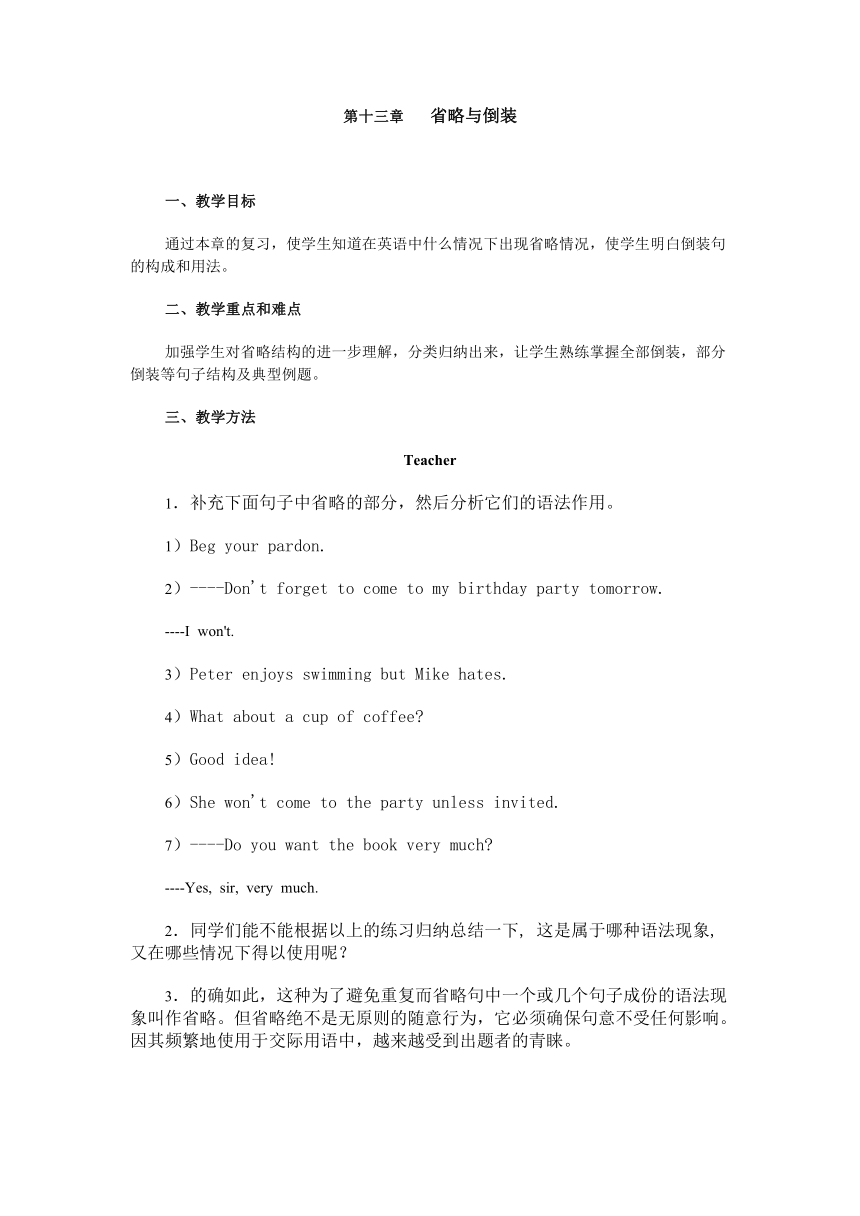
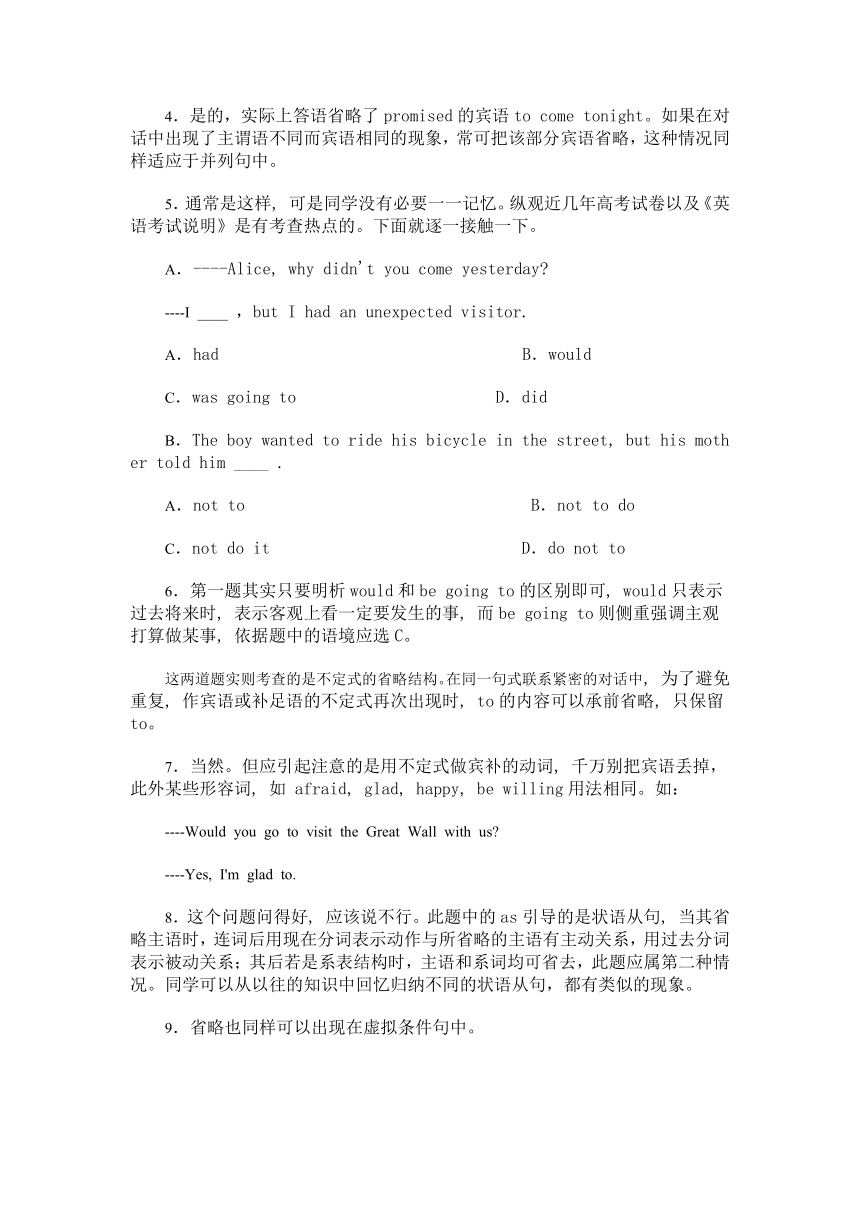
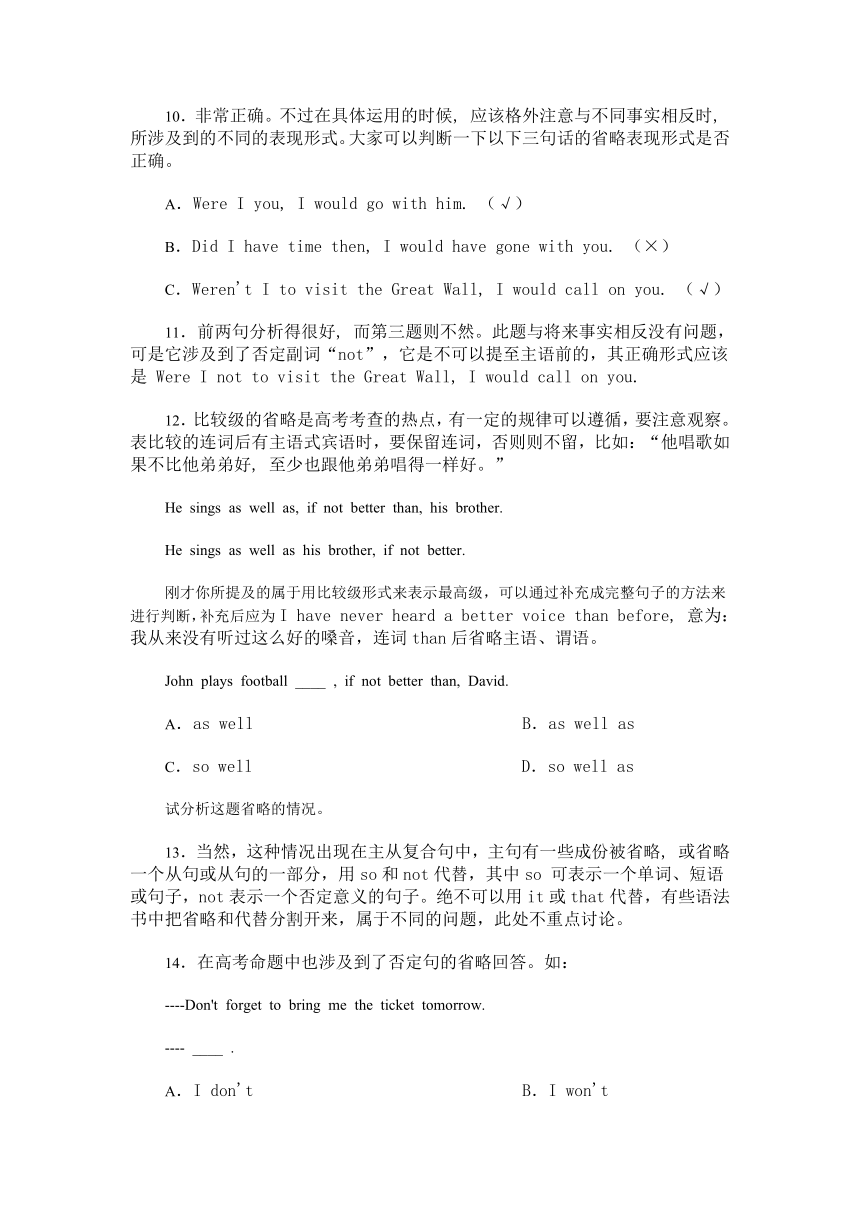
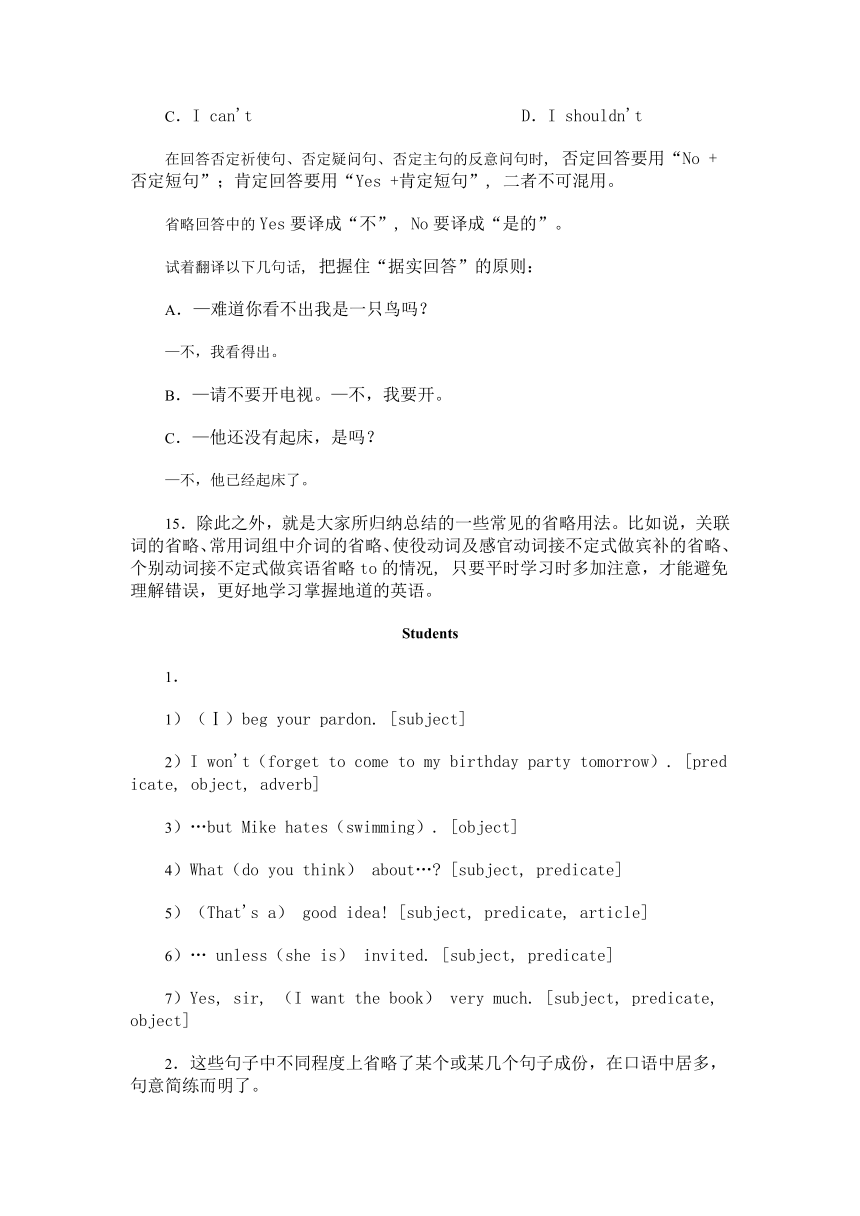
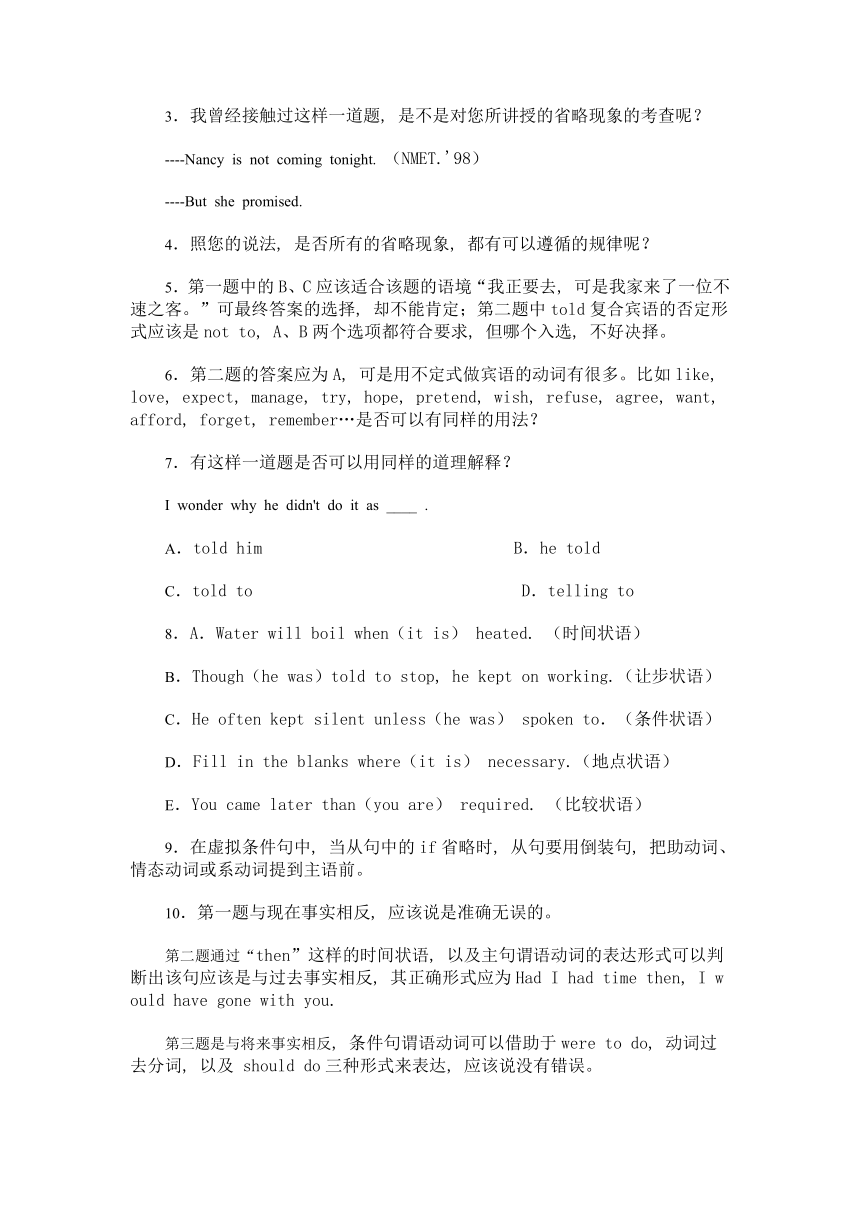
文档简介
第十三章 省略与倒装
一、教学目标
通过本章的复习,使学生知道在英语中什么情况下出现省略情况,使学生明白倒装句的构成和用法。
二、教学重点和难点
加强学生对省略结构的进一步理解,分类归纳出来,让学生熟练掌握全部倒装,部分倒装等句子结构及典型例题。
三、教学方法
Teacher
1.补充下面句子中省略的部分,然后分析它们的语法作用。
1)Beg your pardon.
2)----Don't forget to come to my birthday party tomorrow.
----I won't.
3)Peter enjoys swimming but Mike hates.
4)What about a cup of coffee
5)Good idea!
6)She won't come to the party unless invited.
7)----Do you want the book very much
----Yes, sir, very much.
2.同学们能不能根据以上的练习归纳总结一下, 这是属于哪种语法现象, 又在哪些情况下得以使用呢?
3.的确如此,这种为了避免重复而省略句中一个或几个句子成份的语法现象叫作省略。但省略绝不是无原则的随意行为,它必须确保句意不受任何影响。因其频繁地使用于交际用语中,越来越受到出题者的青睐。
4.是的,实际上答语省略了promised的宾语to come tonight。如果在对话中出现了主谓语不同而宾语相同的现象,常可把该部分宾语省略,这种情况同样适应于并列句中。
5.通常是这样, 可是同学没有必要一一记忆。纵观近几年高考试卷以及《英语考试说明》是有考查热点的。下面就逐一接触一下。
A.----Alice, why didn't you come yesterday
----I ____ ,but I had an unexpected visitor.
A.had B.would
C.was going to D.did
B.The boy wanted to ride his bicycle in the street, but his mother told him ____ .
A.not to B.not to do
C.not do it D.do not to
6.第一题其实只要明析would和be going to的区别即可, would只表示过去将来时, 表示客观上看一定要发生的事, 而be going to则侧重强调主观打算做某事, 依据题中的语境应选C。
这两道题实则考查的是不定式的省略结构。在同一句式联系紧密的对话中, 为了避免重复, 作宾语或补足语的不定式再次出现时, to的内容可以承前省略, 只保留to。
7.当然。但应引起注意的是用不定式做宾补的动词, 千万别把宾语丢掉,此外某些形容词, 如 afraid, glad, happy, be willing用法相同。如:
----Would you go to visit the Great Wall with us
----Yes, I'm glad to.
8.这个问题问得好, 应该说不行。此题中的as引导的是状语从句, 当其省略主语时,连词后用现在分词表示动作与所省略的主语有主动关系,用过去分词表示被动关系;其后若是系表结构时,主语和系词均可省去,此题应属第二种情况。同学可以从以往的知识中回忆归纳不同的状语从句,都有类似的现象。
9.省略也同样可以出现在虚拟条件句中。
10.非常正确。不过在具体运用的时候, 应该格外注意与不同事实相反时, 所涉及到的不同的表现形式。大家可以判断一下以下三句话的省略表现形式是否正确。
A.Were I you, I would go with him. (√)
B.Did I have time then, I would have gone with you. (×)
C.Weren't I to visit the Great Wall, I would call on you. (√)
11.前两句分析得很好, 而第三题则不然。此题与将来事实相反没有问题,可是它涉及到了否定副词“not”,它是不可以提至主语前的,其正确形式应该是 Were I not to visit the Great Wall, I would call on you.
12.比较级的省略是高考考查的热点,有一定的规律可以遵循,要注意观察。表比较的连词后有主语式宾语时,要保留连词,否则则不留,比如:“他唱歌如果不比他弟弟好, 至少也跟他弟弟唱得一样好。”
He sings as well as, if not better than, his brother.
He sings as well as his brother, if not better.
刚才你所提及的属于用比较级形式来表示最高级,可以通过补充成完整句子的方法来进行判断,补充后应为I have never heard a better voice than before, 意为:我从来没有听过这么好的嗓音,连词than后省略主语、谓语。
John plays football ____ , if not better than, David.
A.as well B.as well as
C.so well D.so well as
试分析这题省略的情况。
13.当然,这种情况出现在主从复合句中,主句有一些成份被省略, 或省略一个从句或从句的一部分,用so和not代替,其中so 可表示一个单词、短语或句子,not表示一个否定意义的句子。绝不可以用it或that代替,有些语法书中把省略和代替分割开来,属于不同的问题,此处不重点讨论。
14.在高考命题中也涉及到了否定句的省略回答。如:
----Don't forget to bring me the ticket tomorrow.
---- ____ .
A.I don't B.I won't
C.I can't D.I shouldn't
在回答否定祈使句、否定疑问句、否定主句的反意问句时, 否定回答要用“No + 否定短句”;肯定回答要用“Yes +肯定短句”, 二者不可混用。
省略回答中的Yes要译成“不”, No要译成“是的”。
试着翻译以下几句话, 把握住“据实回答”的原则:
A.—难道你看不出我是一只鸟吗?
—不,我看得出。
B.—请不要开电视。—不,我要开。
C.—他还没有起床,是吗?
—不,他已经起床了。
15.除此之外,就是大家所归纳总结的一些常见的省略用法。比如说,关联词的省略、常用词组中介词的省略、使役动词及感官动词接不定式做宾补的省略、个别动词接不定式做宾语省略to的情况, 只要平时学习时多加注意,才能避免理解错误,更好地学习掌握地道的英语。
Students
1.
1)(Ⅰ)beg your pardon. [subject]
2)I won't(forget to come to my birthday party tomorrow). [predicate, object, adverb]
3)…but Mike hates(swimming). [object]
4)What(do you think) about… [subject, predicate]
5)(That's a) good idea! [subject, predicate, article]
6)… unless(she is) invited. [subject, predicate]
7)Yes, sir, (I want the book) very much. [subject, predicate, object]
2.这些句子中不同程度上省略了某个或某几个句子成份,在口语中居多,句意简练而明了。
3.我曾经接触过这样一道题, 是不是对您所讲授的省略现象的考查呢?
----Nancy is not coming tonight. (NMET.'98)
----But she promised.
4.照您的说法, 是否所有的省略现象, 都有可以遵循的规律呢?
5.第一题中的B、C应该适合该题的语境“我正要去, 可是我家来了一位不速之客。”可最终答案的选择, 却不能肯定;第二题中told复合宾语的否定形式应该是not to, A、B两个选项都符合要求, 但哪个入选, 不好决择。
6.第二题的答案应为A, 可是用不定式做宾语的动词有很多。比如like, love, expect, manage, try, hope, pretend, wish, refuse, agree, want, afford, forget, remember…是否可以有同样的用法?
7.有这样一道题是否可以用同样的道理解释?
I wonder why he didn't do it as ____ .
A.told him B.he told
C.told to D.telling to
8.A.Water will boil when(it is) heated. (时间状语)
B.Though(he was)told to stop, he kept on working.(让步状语)
C.He often kept silent unless(he was) spoken to.(条件状语)
D.Fill in the blanks where(it is) necessary.(地点状语)
E.You came later than(you are) required. (比较状语)
9.在虚拟条件句中, 当从句中的if省略时, 从句要用倒装句, 把助动词、情态动词或系动词提到主语前。
10.第一题与现在事实相反, 应该说是准确无误的。
第二题通过“then”这样的时间状语, 以及主句谓语动词的表达形式可以判断出该句应该是与过去事实相反, 其正确形式应为Had I had time then, I would have gone with you.
第三题是与将来事实相反, 条件句谓语动词可以借助于were to do, 动词过去分词, 以及 should do三种形式来表达, 应该说没有错误。
11.(NMET'96) How beautifully she sings! I have never heard ____ __ before.
A.the better voice B.a good voice
C.the best voice D.a better voice
是属于比较级的省略, 这样的题有什么技巧吗?
12.if not better than应属于插入语, 可以先把它省去。全句应为:John plays as well as David(if he doesn't play better than David).
A、C两项因连词不全而应排除, D项只用于否定句、疑问句, 故答案为B项。
13.省略的形式确实不少, 在某些交际用语中, 我们经常接触到这样的情况。
A.----Is she going to see the film tomorrow
----I think so.
B.----Are you feeling better today
----I'm afraid not.
这两句是否属于省略范畴?
14.A.----Can't you see I'm a bird
----Yes, I can.
B.----Don't turn on the radio, please.
----Yes, I will.
C.----She hasn't got up, has she
----Yes, she has.
刚才您介绍了句子成份的省略;to的省略;虚拟语气中的省略;比较级的省略;so、not的替代以及否定词的否定回答。除掌握这些知识点之外,我们还应该注意哪些问题呢?
15.A.在定语从句中, 关系代词 that, which, whom在从句中做宾语,只要不放在介词之后,就经常省略。
B.在定语从句中,先行词是time或way时,引导从句的词可以省略。
C.that引导宾语从句时,由于本身无意义,作从句中动词宾语时可省略。
D.介词的省略:
spend time(in) doing sth.
have trouble(in)doing sth.
be busy(in)doing sth.
stop/prevent sb. (from) doing sth.
倒装(Inversion)
Teacher
1.英语中最基本的语序有两种, 一种是陈述语序, 而另一种是倒装语序。那么倒装句又可以分为哪两种类型, 它又有哪些实际意义呢?
2.两种形式掌握得很好, 而它的实际意义不仅限于语法结构的要求, 以下两句话请同学们自己体会它的意义, 并译成汉语:
A.Never have I been late for school this term.
B.So early did he come to school that no other students came.
3.完全倒装和部分倒装的区别是倒装句的难点。下面咱们来共同归纳总结一下。先讲全部倒装部分, 同学们回忆以前所学的知识先自己归纳一下。
4.归纳的不错。但是当地点状语置于句首时, 应注意主谓一致的问题。如:On the table were some oranges.句中be的单复数形式应由其主语 oranges决定, 而不是 table;再有由there, here, now, then引导的为了引起别人的注意的招呼句中若主语是人称代词时主语和谓语动词应用正常语序, 如把the bell 换成it, 就会出现There it goes! 除此之外, 大家通过自己分析以下各句来把完全倒装的其他几种形式总结出来:
A.There came shouts for help from the river.
B.Such was Albert Einstein.
C.In rushed the children.
D.They reached a farmhouse, in front of which sat a small boy.
5.There come实际和 There be都表示“存在”的意思。常见的动词还有:lie, happen, appear, seem, stand, exist, live, enter, remain…它们的具体形式应由其后的主语名词来决定。第三句中的in是表示“动态”的状语而非介词,类似的还有out, away, up, down, from, back, off, over, 置于句首,需要用完全倒装形式。应该注意的是主语为“人称代词”时用正常语序,最后一句是为了平衡句子结构或使上下文紧密衔接。值得注意的是主谓一致的问题:“Gone are the days when we Chinese people used foreign oil.”
6.部分倒装实际上就是语序用一般疑问句语序。下面同学们分析几道题来总结一下可能出现的类型:
A.I like sports and ____ my brother. [ ]
A.so does B.so is
C.so D.so like
B.John won the first prize in the contest. ____ . [ ]
A.So he did B.So did he
C.So he did, too D.So did he, too
C.----I don't think I can walk any further. [ ]
---- ____ . Let's stop here for a rest.
A.Neither am I B.Neither can I
C.I don't think so D.I think so
D.----Do you know Jim quarrelled with his brother [ ]
----I don't know. ____ .
A.Nor don't I care B.Nor do I care
C.I don't care either D.I don't care so
E.Not until the early years of the 19th century ____ what heat is. [ ]
A.man did know B.man knew
C.didn't man know D.did man know
F.Only in this way ____ progress in your English. [ ]
A.you make
B.can you make
C.you are able to make
D.will you able to make
G.____ , he doesn't study well. [ ]
A.As he is clever B.He is as clever
C.Clever as he is D.As clever he is
7.还有这样的词组:Not only…but also; No sooner… than; Hardly… when; Scarcely… when; So… that; Such… that句型。以such… that为例:Such great progress did he make that he was praised.
除此之外, 一些否定意义的副词置于句首, 也有同样的用法, 同学们可以自己归纳。
试着翻译以下句子;
A.我从来不知道这部电影那么有趣。
B.我几乎不敢想这是可能的。
C.理论离不开实践, 同样实践也离不开理论。
8.Only之后接副词和状语从句时使用部分倒装, 看两个例句:
1)Only then did I realize I was wrong.
2)Only when I reached the Great Wall did I realize how great our country is.
9.让步状语中, 有一点容易出现错误:如果表语为名词, 在提到as/though之前时, 冠词要省略。如:Hero as he is, he has some shortcomings.此外, 在省略if的虚拟语气条件句中, 要将 were/had/should移至主语前。
翻译下面几句话:
A.假如现在他在的话, 我就要问问他。
B.假如没有你的帮助, 我就不会及格了。
C.如果他要来的话, 告诉他给我打电话。
10.一些标语中的口号也有用完全倒装语序的, 如:Long live the people!
诸多的倒装句形式, 同学们应深刻领会, 抓牢记实, 以达到灵活准确运用的程度, 争取拿到理想的分数。
Students
1.如果把谓语中的助动词、情态动词放在主语之前, 称为部分倒装, 把谓语全部移到主语之前, 称为完全倒装;这样的语序可能是为了适应一定的语法结构的需要吧。
2.A.这学期我上学从未迟到过。
B.他到学校太早了,别的同学还没有到呢。
用这种语序应该是为了突出强调“从未”和“太早”这两个意思。
3.在直接引语中就有把谓语置于句首的用法, 也见过把地点状语置于句首用以强调“地点”的用法, 口语中也出现过Here goes the bell.的说法。
4.接触过There be句型,却未见到过There comes, 是不是它们之间有什么联系?such在句中作表语, 译作“就是如此”的含义, 其谓语动词的形式与其后的主语保持人称和数的一致。
6.A题应选A。表示“……也一样”, 用于肯定句中。它的句式结构应该是So do/be sb.。do或be的选择由上句中的谓语形式来确定。
B题选用A。因为根据题干所设置的语境应是“约翰在比赛中拿了头名。”而听话人的答复是对前句的内容予以肯定和附和, 欲体现“确定、正是”的含义。应用自然语序So sb. do/be.。故答案为A。
C题中设置的语境应是“我觉得我再也不能往前迈一步了”, 后者和他有同样的感觉, 建议停下来稍稍休息。正好是“Neither do/be sb.”的用法, 故答案为B。
D题因第二人想表示“我不知道也不关注”这样的意境, 用“Nor do/be sb.”因此选B。
E题答案为D。Not until这样否定意义的词组, 置于句首时谓语要求用部分倒装, 类似这样的用法的词组还有哪些呢?
7.像这样的副词还有:never, seldom, hardly, scarcely, barely, rarely, not little…
A.Never have I known the film is so interesting.
B.Hardly do I think it possible.
C.Neither will theory do without practice nor will practice do without theory.
8.Only后接介词补语要求用部分倒装, F句中答案只能在B、D中选择。而D项中缺少“be”动词不能入选, 正确选项应为B。是否还有其他情况也用倒装呢?
9.最后一道题是由though和as引导的让步状语从句, 可以把状语从句、状语以及动词原形放到它们之前, 答案为C。
A.Were he here now, I could ask him.
B.Had you not helped me, I'd have failed.
C.Should he come, tell him to ring me up.
我平时听到这样的句子:----May you succeed.(祝你成功。)是否也可以这样使用?
四、精选题
1.----Where is your father ----Oh, ____ . [ ]
A.here comes he B.here does he come
C.he here comes D.here he comes
2.Look, ____ . [ ]
A.here the bus comes
B.here is the bus coming
C.here comes the bus
D.here the bus is coming
3. ____ , I would have phoned you. [ ]
A.If I knew it B.Had I known it
C.If I know it D.Did I know it
4. ____ in the river yesterday, the boy ____ . [ ]
A.Were Mr Black not; would not be drowned
B.Were Mr Black ; would be drowned
C.Had Mr Black not been; would have been drowned
D.Hadn't Mr Black been; would have drowned
5. ----It was cold yesterday. ---- ____ . Which of the following is wrong
[ ]
A.So it was
B.So is it today
C.So was it the day before
D.So it did
6.----You ought to have given them some advice.---- ____ , but who. cared what I said
A.So ought you B.So I ought
C.So did you D.So I did
7. ----She's passed the entrance examination. ---- ____ . [ ]
A.So am I B.So have I
C.So I have D.Also I have
8. ____ no one in the class has any idea of what has happened. [ ]
A.Almost B.Nearly
C.Only D.Hardly
9. ____ that he found it difficult to stop at the red light. [ ]
A.So fast he was driving
B.So fast he drove
C.So fast was he driving
D.So fast drive he
10. Hardly ____ the railway station when the train started. [ ]
A.did reach B.had I reached
C.I reached D.I had reached
11. No sooner ____ asleep than she heard a knock at the door. [ ]
A.she had fallen B.had she fallen
C.she had fell D.had she fell
12. Only after his death ____ considered correct. [ ]
A.was his theory B.his theory was
C.did his theory D.had his theory
13. ____ his appearance that no one could recognize him. [ ]
A.So was strange B.Was so strange
C.So strange was D.Strange so was
14. ____ about her illness and still worked very hard. [ ]
A.She knows little
B.Little did she know
C.Little does she know
D.She didn't know something
15. Only when the line was fixed ____ from floating away from the spaceship. [ ]
A.could he keep B.he could keep
C.he could be kept D.could he be kept
16. ____ , she wanted to buy her husband a Christmas gift. [ ]
A.As she was short of money
B.Though money is short
C.She was short of money
D.Short of money as she was
17. Not only was Jane bright, ____ . [ ]
A.was she also helpful
B.but also she was very beautiful
C.but also she was hard-working
D.but was she kind as well
18. ____ about the universe up till now. [ ]
A.We know quite a lot
B.Only little we have known
C.Very little have we known
D.So much we do know
19. ____ , she was very brave. [ ]
A.Girl as she was B.As she was a girl
C.A girl as she was D.Girl as was she
20. Such ____ the results of the experiments. [ ]
A.is B.was
C.are D.as be
21. Albert Einstein cared little for money. ____ Professor Wang. [ ]
A.Either did B.So was
C.So did D.Neither did
22. ____ with his slippers on when he heard the terrible noise. [ ]
A.Rushed he out B.Out rushed he
C.Out he rushed D.Out did he rush
23. ____ there no gravity, there would be no human beings on the earth. [ ]
A.If B.If was
C.If not D.Were
24. Hardly ____ in the theatre ____ the curtain went up. [ ]
A.had they seated; as
B.they had been seated; than
C.had they been seated; before
D.had they seated themselves; when
25. Only when ____ the painting ____ decide whether the painting is worth buying. [ ]
A.the sees; he can
B.does he see; can he
C.he sees; can he
D.sees he; he can
26. ____ to him. [ ]
A.Not a word I ever say
B.didn't ever say a word
C.Not a word did I ever say
D.Not did I ever say a word
27. Never before ____ seen such a stupid man. [ ]
A.am I B.was I
C.have I D.shall I
28. On the wall ____ two large portraits. [ ]
A.hangs B.hang
C.hanged D.are hanging
29. ____ and caught the mouse. [ ]
A.Up the cat jumped
B.The cat up jumped
C.Up jumped the cat
D.Jumped up the cat
30. Never in my life ____ such a thing. [ ]
A.I have heard of or seen
B.I had heard of or seen
C.have I heard of or seen
D.did I hear of or seen
31.----Alice, why didn't you come yesterday [ ]
----I ____ , but I had an unexpected visitor.
A.had B.would
C.was going to D.did
32. ----Please don't make a noise. ---- ____ . I'll be as quiet as a mouse. [ ]
A.Yes , I won't B.No , I won't
C.No , I will D.Yes , I will
33. If you go to Xi'an, you will find the palaces there more magnificent than commonly ____ . [ ]
A.supposing B.supposed
C.to suppose D.suppose
34. ____ it rain tomorrow, we would have to put off the visit to the Yang pu Bridge. [ ]
A.Were B.Should
C.Would D.Will
35. John plays football ____ , if not better than, David. [ ]
A.as well B.as well as
C.so well D.so well as
答案
1~10 DCBCDDBACB
11~20 BACBDDCCAC
21~30 DCDDCCCBCC
31~35 CBBBB
一、教学目标
通过本章的复习,使学生知道在英语中什么情况下出现省略情况,使学生明白倒装句的构成和用法。
二、教学重点和难点
加强学生对省略结构的进一步理解,分类归纳出来,让学生熟练掌握全部倒装,部分倒装等句子结构及典型例题。
三、教学方法
Teacher
1.补充下面句子中省略的部分,然后分析它们的语法作用。
1)Beg your pardon.
2)----Don't forget to come to my birthday party tomorrow.
----I won't.
3)Peter enjoys swimming but Mike hates.
4)What about a cup of coffee
5)Good idea!
6)She won't come to the party unless invited.
7)----Do you want the book very much
----Yes, sir, very much.
2.同学们能不能根据以上的练习归纳总结一下, 这是属于哪种语法现象, 又在哪些情况下得以使用呢?
3.的确如此,这种为了避免重复而省略句中一个或几个句子成份的语法现象叫作省略。但省略绝不是无原则的随意行为,它必须确保句意不受任何影响。因其频繁地使用于交际用语中,越来越受到出题者的青睐。
4.是的,实际上答语省略了promised的宾语to come tonight。如果在对话中出现了主谓语不同而宾语相同的现象,常可把该部分宾语省略,这种情况同样适应于并列句中。
5.通常是这样, 可是同学没有必要一一记忆。纵观近几年高考试卷以及《英语考试说明》是有考查热点的。下面就逐一接触一下。
A.----Alice, why didn't you come yesterday
----I ____ ,but I had an unexpected visitor.
A.had B.would
C.was going to D.did
B.The boy wanted to ride his bicycle in the street, but his mother told him ____ .
A.not to B.not to do
C.not do it D.do not to
6.第一题其实只要明析would和be going to的区别即可, would只表示过去将来时, 表示客观上看一定要发生的事, 而be going to则侧重强调主观打算做某事, 依据题中的语境应选C。
这两道题实则考查的是不定式的省略结构。在同一句式联系紧密的对话中, 为了避免重复, 作宾语或补足语的不定式再次出现时, to的内容可以承前省略, 只保留to。
7.当然。但应引起注意的是用不定式做宾补的动词, 千万别把宾语丢掉,此外某些形容词, 如 afraid, glad, happy, be willing用法相同。如:
----Would you go to visit the Great Wall with us
----Yes, I'm glad to.
8.这个问题问得好, 应该说不行。此题中的as引导的是状语从句, 当其省略主语时,连词后用现在分词表示动作与所省略的主语有主动关系,用过去分词表示被动关系;其后若是系表结构时,主语和系词均可省去,此题应属第二种情况。同学可以从以往的知识中回忆归纳不同的状语从句,都有类似的现象。
9.省略也同样可以出现在虚拟条件句中。
10.非常正确。不过在具体运用的时候, 应该格外注意与不同事实相反时, 所涉及到的不同的表现形式。大家可以判断一下以下三句话的省略表现形式是否正确。
A.Were I you, I would go with him. (√)
B.Did I have time then, I would have gone with you. (×)
C.Weren't I to visit the Great Wall, I would call on you. (√)
11.前两句分析得很好, 而第三题则不然。此题与将来事实相反没有问题,可是它涉及到了否定副词“not”,它是不可以提至主语前的,其正确形式应该是 Were I not to visit the Great Wall, I would call on you.
12.比较级的省略是高考考查的热点,有一定的规律可以遵循,要注意观察。表比较的连词后有主语式宾语时,要保留连词,否则则不留,比如:“他唱歌如果不比他弟弟好, 至少也跟他弟弟唱得一样好。”
He sings as well as, if not better than, his brother.
He sings as well as his brother, if not better.
刚才你所提及的属于用比较级形式来表示最高级,可以通过补充成完整句子的方法来进行判断,补充后应为I have never heard a better voice than before, 意为:我从来没有听过这么好的嗓音,连词than后省略主语、谓语。
John plays football ____ , if not better than, David.
A.as well B.as well as
C.so well D.so well as
试分析这题省略的情况。
13.当然,这种情况出现在主从复合句中,主句有一些成份被省略, 或省略一个从句或从句的一部分,用so和not代替,其中so 可表示一个单词、短语或句子,not表示一个否定意义的句子。绝不可以用it或that代替,有些语法书中把省略和代替分割开来,属于不同的问题,此处不重点讨论。
14.在高考命题中也涉及到了否定句的省略回答。如:
----Don't forget to bring me the ticket tomorrow.
---- ____ .
A.I don't B.I won't
C.I can't D.I shouldn't
在回答否定祈使句、否定疑问句、否定主句的反意问句时, 否定回答要用“No + 否定短句”;肯定回答要用“Yes +肯定短句”, 二者不可混用。
省略回答中的Yes要译成“不”, No要译成“是的”。
试着翻译以下几句话, 把握住“据实回答”的原则:
A.—难道你看不出我是一只鸟吗?
—不,我看得出。
B.—请不要开电视。—不,我要开。
C.—他还没有起床,是吗?
—不,他已经起床了。
15.除此之外,就是大家所归纳总结的一些常见的省略用法。比如说,关联词的省略、常用词组中介词的省略、使役动词及感官动词接不定式做宾补的省略、个别动词接不定式做宾语省略to的情况, 只要平时学习时多加注意,才能避免理解错误,更好地学习掌握地道的英语。
Students
1.
1)(Ⅰ)beg your pardon. [subject]
2)I won't(forget to come to my birthday party tomorrow). [predicate, object, adverb]
3)…but Mike hates(swimming). [object]
4)What(do you think) about… [subject, predicate]
5)(That's a) good idea! [subject, predicate, article]
6)… unless(she is) invited. [subject, predicate]
7)Yes, sir, (I want the book) very much. [subject, predicate, object]
2.这些句子中不同程度上省略了某个或某几个句子成份,在口语中居多,句意简练而明了。
3.我曾经接触过这样一道题, 是不是对您所讲授的省略现象的考查呢?
----Nancy is not coming tonight. (NMET.'98)
----But she promised.
4.照您的说法, 是否所有的省略现象, 都有可以遵循的规律呢?
5.第一题中的B、C应该适合该题的语境“我正要去, 可是我家来了一位不速之客。”可最终答案的选择, 却不能肯定;第二题中told复合宾语的否定形式应该是not to, A、B两个选项都符合要求, 但哪个入选, 不好决择。
6.第二题的答案应为A, 可是用不定式做宾语的动词有很多。比如like, love, expect, manage, try, hope, pretend, wish, refuse, agree, want, afford, forget, remember…是否可以有同样的用法?
7.有这样一道题是否可以用同样的道理解释?
I wonder why he didn't do it as ____ .
A.told him B.he told
C.told to D.telling to
8.A.Water will boil when(it is) heated. (时间状语)
B.Though(he was)told to stop, he kept on working.(让步状语)
C.He often kept silent unless(he was) spoken to.(条件状语)
D.Fill in the blanks where(it is) necessary.(地点状语)
E.You came later than(you are) required. (比较状语)
9.在虚拟条件句中, 当从句中的if省略时, 从句要用倒装句, 把助动词、情态动词或系动词提到主语前。
10.第一题与现在事实相反, 应该说是准确无误的。
第二题通过“then”这样的时间状语, 以及主句谓语动词的表达形式可以判断出该句应该是与过去事实相反, 其正确形式应为Had I had time then, I would have gone with you.
第三题是与将来事实相反, 条件句谓语动词可以借助于were to do, 动词过去分词, 以及 should do三种形式来表达, 应该说没有错误。
11.(NMET'96) How beautifully she sings! I have never heard ____ __ before.
A.the better voice B.a good voice
C.the best voice D.a better voice
是属于比较级的省略, 这样的题有什么技巧吗?
12.if not better than应属于插入语, 可以先把它省去。全句应为:John plays as well as David(if he doesn't play better than David).
A、C两项因连词不全而应排除, D项只用于否定句、疑问句, 故答案为B项。
13.省略的形式确实不少, 在某些交际用语中, 我们经常接触到这样的情况。
A.----Is she going to see the film tomorrow
----I think so.
B.----Are you feeling better today
----I'm afraid not.
这两句是否属于省略范畴?
14.A.----Can't you see I'm a bird
----Yes, I can.
B.----Don't turn on the radio, please.
----Yes, I will.
C.----She hasn't got up, has she
----Yes, she has.
刚才您介绍了句子成份的省略;to的省略;虚拟语气中的省略;比较级的省略;so、not的替代以及否定词的否定回答。除掌握这些知识点之外,我们还应该注意哪些问题呢?
15.A.在定语从句中, 关系代词 that, which, whom在从句中做宾语,只要不放在介词之后,就经常省略。
B.在定语从句中,先行词是time或way时,引导从句的词可以省略。
C.that引导宾语从句时,由于本身无意义,作从句中动词宾语时可省略。
D.介词的省略:
spend time(in) doing sth.
have trouble(in)doing sth.
be busy(in)doing sth.
stop/prevent sb. (from) doing sth.
倒装(Inversion)
Teacher
1.英语中最基本的语序有两种, 一种是陈述语序, 而另一种是倒装语序。那么倒装句又可以分为哪两种类型, 它又有哪些实际意义呢?
2.两种形式掌握得很好, 而它的实际意义不仅限于语法结构的要求, 以下两句话请同学们自己体会它的意义, 并译成汉语:
A.Never have I been late for school this term.
B.So early did he come to school that no other students came.
3.完全倒装和部分倒装的区别是倒装句的难点。下面咱们来共同归纳总结一下。先讲全部倒装部分, 同学们回忆以前所学的知识先自己归纳一下。
4.归纳的不错。但是当地点状语置于句首时, 应注意主谓一致的问题。如:On the table were some oranges.句中be的单复数形式应由其主语 oranges决定, 而不是 table;再有由there, here, now, then引导的为了引起别人的注意的招呼句中若主语是人称代词时主语和谓语动词应用正常语序, 如把the bell 换成it, 就会出现There it goes! 除此之外, 大家通过自己分析以下各句来把完全倒装的其他几种形式总结出来:
A.There came shouts for help from the river.
B.Such was Albert Einstein.
C.In rushed the children.
D.They reached a farmhouse, in front of which sat a small boy.
5.There come实际和 There be都表示“存在”的意思。常见的动词还有:lie, happen, appear, seem, stand, exist, live, enter, remain…它们的具体形式应由其后的主语名词来决定。第三句中的in是表示“动态”的状语而非介词,类似的还有out, away, up, down, from, back, off, over, 置于句首,需要用完全倒装形式。应该注意的是主语为“人称代词”时用正常语序,最后一句是为了平衡句子结构或使上下文紧密衔接。值得注意的是主谓一致的问题:“Gone are the days when we Chinese people used foreign oil.”
6.部分倒装实际上就是语序用一般疑问句语序。下面同学们分析几道题来总结一下可能出现的类型:
A.I like sports and ____ my brother. [ ]
A.so does B.so is
C.so D.so like
B.John won the first prize in the contest. ____ . [ ]
A.So he did B.So did he
C.So he did, too D.So did he, too
C.----I don't think I can walk any further. [ ]
---- ____ . Let's stop here for a rest.
A.Neither am I B.Neither can I
C.I don't think so D.I think so
D.----Do you know Jim quarrelled with his brother [ ]
----I don't know. ____ .
A.Nor don't I care B.Nor do I care
C.I don't care either D.I don't care so
E.Not until the early years of the 19th century ____ what heat is. [ ]
A.man did know B.man knew
C.didn't man know D.did man know
F.Only in this way ____ progress in your English. [ ]
A.you make
B.can you make
C.you are able to make
D.will you able to make
G.____ , he doesn't study well. [ ]
A.As he is clever B.He is as clever
C.Clever as he is D.As clever he is
7.还有这样的词组:Not only…but also; No sooner… than; Hardly… when; Scarcely… when; So… that; Such… that句型。以such… that为例:Such great progress did he make that he was praised.
除此之外, 一些否定意义的副词置于句首, 也有同样的用法, 同学们可以自己归纳。
试着翻译以下句子;
A.我从来不知道这部电影那么有趣。
B.我几乎不敢想这是可能的。
C.理论离不开实践, 同样实践也离不开理论。
8.Only之后接副词和状语从句时使用部分倒装, 看两个例句:
1)Only then did I realize I was wrong.
2)Only when I reached the Great Wall did I realize how great our country is.
9.让步状语中, 有一点容易出现错误:如果表语为名词, 在提到as/though之前时, 冠词要省略。如:Hero as he is, he has some shortcomings.此外, 在省略if的虚拟语气条件句中, 要将 were/had/should移至主语前。
翻译下面几句话:
A.假如现在他在的话, 我就要问问他。
B.假如没有你的帮助, 我就不会及格了。
C.如果他要来的话, 告诉他给我打电话。
10.一些标语中的口号也有用完全倒装语序的, 如:Long live the people!
诸多的倒装句形式, 同学们应深刻领会, 抓牢记实, 以达到灵活准确运用的程度, 争取拿到理想的分数。
Students
1.如果把谓语中的助动词、情态动词放在主语之前, 称为部分倒装, 把谓语全部移到主语之前, 称为完全倒装;这样的语序可能是为了适应一定的语法结构的需要吧。
2.A.这学期我上学从未迟到过。
B.他到学校太早了,别的同学还没有到呢。
用这种语序应该是为了突出强调“从未”和“太早”这两个意思。
3.在直接引语中就有把谓语置于句首的用法, 也见过把地点状语置于句首用以强调“地点”的用法, 口语中也出现过Here goes the bell.的说法。
4.接触过There be句型,却未见到过There comes, 是不是它们之间有什么联系?such在句中作表语, 译作“就是如此”的含义, 其谓语动词的形式与其后的主语保持人称和数的一致。
6.A题应选A。表示“……也一样”, 用于肯定句中。它的句式结构应该是So do/be sb.。do或be的选择由上句中的谓语形式来确定。
B题选用A。因为根据题干所设置的语境应是“约翰在比赛中拿了头名。”而听话人的答复是对前句的内容予以肯定和附和, 欲体现“确定、正是”的含义。应用自然语序So sb. do/be.。故答案为A。
C题中设置的语境应是“我觉得我再也不能往前迈一步了”, 后者和他有同样的感觉, 建议停下来稍稍休息。正好是“Neither do/be sb.”的用法, 故答案为B。
D题因第二人想表示“我不知道也不关注”这样的意境, 用“Nor do/be sb.”因此选B。
E题答案为D。Not until这样否定意义的词组, 置于句首时谓语要求用部分倒装, 类似这样的用法的词组还有哪些呢?
7.像这样的副词还有:never, seldom, hardly, scarcely, barely, rarely, not little…
A.Never have I known the film is so interesting.
B.Hardly do I think it possible.
C.Neither will theory do without practice nor will practice do without theory.
8.Only后接介词补语要求用部分倒装, F句中答案只能在B、D中选择。而D项中缺少“be”动词不能入选, 正确选项应为B。是否还有其他情况也用倒装呢?
9.最后一道题是由though和as引导的让步状语从句, 可以把状语从句、状语以及动词原形放到它们之前, 答案为C。
A.Were he here now, I could ask him.
B.Had you not helped me, I'd have failed.
C.Should he come, tell him to ring me up.
我平时听到这样的句子:----May you succeed.(祝你成功。)是否也可以这样使用?
四、精选题
1.----Where is your father ----Oh, ____ . [ ]
A.here comes he B.here does he come
C.he here comes D.here he comes
2.Look, ____ . [ ]
A.here the bus comes
B.here is the bus coming
C.here comes the bus
D.here the bus is coming
3. ____ , I would have phoned you. [ ]
A.If I knew it B.Had I known it
C.If I know it D.Did I know it
4. ____ in the river yesterday, the boy ____ . [ ]
A.Were Mr Black not; would not be drowned
B.Were Mr Black ; would be drowned
C.Had Mr Black not been; would have been drowned
D.Hadn't Mr Black been; would have drowned
5. ----It was cold yesterday. ---- ____ . Which of the following is wrong
[ ]
A.So it was
B.So is it today
C.So was it the day before
D.So it did
6.----You ought to have given them some advice.---- ____ , but who. cared what I said
A.So ought you B.So I ought
C.So did you D.So I did
7. ----She's passed the entrance examination. ---- ____ . [ ]
A.So am I B.So have I
C.So I have D.Also I have
8. ____ no one in the class has any idea of what has happened. [ ]
A.Almost B.Nearly
C.Only D.Hardly
9. ____ that he found it difficult to stop at the red light. [ ]
A.So fast he was driving
B.So fast he drove
C.So fast was he driving
D.So fast drive he
10. Hardly ____ the railway station when the train started. [ ]
A.did reach B.had I reached
C.I reached D.I had reached
11. No sooner ____ asleep than she heard a knock at the door. [ ]
A.she had fallen B.had she fallen
C.she had fell D.had she fell
12. Only after his death ____ considered correct. [ ]
A.was his theory B.his theory was
C.did his theory D.had his theory
13. ____ his appearance that no one could recognize him. [ ]
A.So was strange B.Was so strange
C.So strange was D.Strange so was
14. ____ about her illness and still worked very hard. [ ]
A.She knows little
B.Little did she know
C.Little does she know
D.She didn't know something
15. Only when the line was fixed ____ from floating away from the spaceship. [ ]
A.could he keep B.he could keep
C.he could be kept D.could he be kept
16. ____ , she wanted to buy her husband a Christmas gift. [ ]
A.As she was short of money
B.Though money is short
C.She was short of money
D.Short of money as she was
17. Not only was Jane bright, ____ . [ ]
A.was she also helpful
B.but also she was very beautiful
C.but also she was hard-working
D.but was she kind as well
18. ____ about the universe up till now. [ ]
A.We know quite a lot
B.Only little we have known
C.Very little have we known
D.So much we do know
19. ____ , she was very brave. [ ]
A.Girl as she was B.As she was a girl
C.A girl as she was D.Girl as was she
20. Such ____ the results of the experiments. [ ]
A.is B.was
C.are D.as be
21. Albert Einstein cared little for money. ____ Professor Wang. [ ]
A.Either did B.So was
C.So did D.Neither did
22. ____ with his slippers on when he heard the terrible noise. [ ]
A.Rushed he out B.Out rushed he
C.Out he rushed D.Out did he rush
23. ____ there no gravity, there would be no human beings on the earth. [ ]
A.If B.If was
C.If not D.Were
24. Hardly ____ in the theatre ____ the curtain went up. [ ]
A.had they seated; as
B.they had been seated; than
C.had they been seated; before
D.had they seated themselves; when
25. Only when ____ the painting ____ decide whether the painting is worth buying. [ ]
A.the sees; he can
B.does he see; can he
C.he sees; can he
D.sees he; he can
26. ____ to him. [ ]
A.Not a word I ever say
B.didn't ever say a word
C.Not a word did I ever say
D.Not did I ever say a word
27. Never before ____ seen such a stupid man. [ ]
A.am I B.was I
C.have I D.shall I
28. On the wall ____ two large portraits. [ ]
A.hangs B.hang
C.hanged D.are hanging
29. ____ and caught the mouse. [ ]
A.Up the cat jumped
B.The cat up jumped
C.Up jumped the cat
D.Jumped up the cat
30. Never in my life ____ such a thing. [ ]
A.I have heard of or seen
B.I had heard of or seen
C.have I heard of or seen
D.did I hear of or seen
31.----Alice, why didn't you come yesterday [ ]
----I ____ , but I had an unexpected visitor.
A.had B.would
C.was going to D.did
32. ----Please don't make a noise. ---- ____ . I'll be as quiet as a mouse. [ ]
A.Yes , I won't B.No , I won't
C.No , I will D.Yes , I will
33. If you go to Xi'an, you will find the palaces there more magnificent than commonly ____ . [ ]
A.supposing B.supposed
C.to suppose D.suppose
34. ____ it rain tomorrow, we would have to put off the visit to the Yang pu Bridge. [ ]
A.Were B.Should
C.Would D.Will
35. John plays football ____ , if not better than, David. [ ]
A.as well B.as well as
C.so well D.so well as
答案
1~10 DCBCDDBACB
11~20 BACBDDCCAC
21~30 DCDDCCCBCC
31~35 CBBBB
